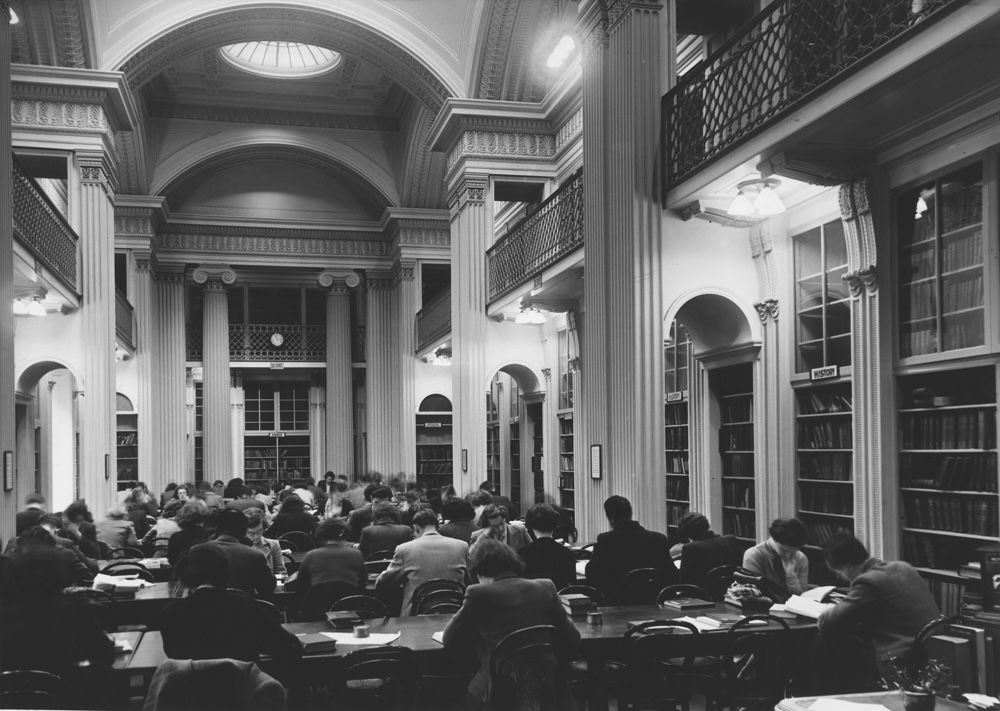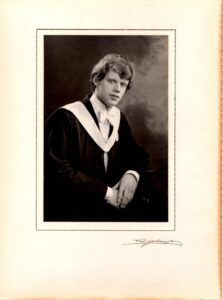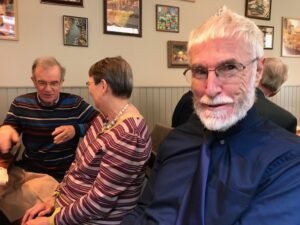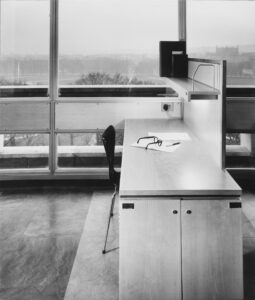History Society Through the Years: The Vibrant 60s

Ian Gordon Brown
Dr Iain Gordon Brown studied History at the University of Edinburgh between 1968 and 1972. He served as the President of the History Society throughout the academic year 1971/72.
After continuing his academic career at St John’s College, Cambridge, Iain eventually returned to Edinburgh to lecture in the University’s former Department of Extra Mural Studies, and join the Manuscripts Department of the National Library of Scotland. Here he worked from 1977 until his retirement in 2011.
Iain is currently an Honorary Fellow of the National Library of Scotland; an Associate of the University of Edinburgh Centre for the History of the Book; and Consultant to the Adam Drawings Project at Sir John Soane’s Museum, London.
Below are his memories from his time as an undergraduate.
“My abiding memory of my year as President must be the night of 23 November 1971 when Sir Rupert Iain Kay Moncreiffe gave a lecture. To say that Sir Iain (1919-85) was a ‘character’ would be to put it mildly. But he was also a first-rate heraldic scholar, genealogist and greatly respected and widely published author. By right he should have ended his career as Lord Lyon King of Arms; but it was generally felt that he could not entirely be relied upon to be sober at State occasions. This fact sets the background for my tale.

Iain Gordon Brown at his Graduation in 1972
Dinner before the lecture had been arranged for the speaker and his wife, Hermione, at the old University Staff Club in Chambers Street. […] Although no such instruction had been issued, the Moncreiffes turned up in evening dress, he in velvet smoking jacket and trews of the loud and bold Moncreiffe tartan. I can remember nothing of the meal; but wine was certainly taken, as one would expect.
As we were preparing to leave for the lecture at the Kirkpatrick History Library in the William Robertson Building, Sir Iain whispered to me that he would like something to drink as he spoke. I assured him at there would be carafe of water and a glass. No, he said: he would like something stronger. He would like Vodka. And not just a glass of Vodka. He would rather like a bottle. A whole bottle.
We stopped at an off-licence. I bought a bottle of Vodka. We reached the Kirkpatrick Library. I was ordered by Sir Iain to take the carafe of water to the lavatory, empty it and refill it with the vodka. All the Vodka. This I did myself: I know that what I write is true. When he took the first sip from his glass he said to the audience (with that twinkling eye of his) that he imagined they thought what he was drinking was water. Only I knew what, in fact, the liquid was.
The lecture (as far as I remember) was a long and discursive ramble through the byways of heraldry and genealogy. Ultimately the liquid ran out, and so did the lecture: when there was no more to drink Sir Iain found no more to say. But he was, to be honest, no more incoherent at the end than he had been at the beginning. He signed my copy of his splendid Simple Heraldry, which had been my own introduction to the subject, and the Moncreiffes left, his step not noticeably unsteady.
I never (I think) met Sir Iain Moncreiffe again, though I read of his doings and used to enjoy the very extensive articles he wrote in Books and Bookmen, usually on aspects of European aristocracy and genealogy: pieces so long and rambling that they had to be divided between issues.
His lecture to the Society in 1971 may not have been the most in keeping with the irreverent and anti-establishment mood of the History department in those days. But it was sparking; and few, if any, speakers could twist their moustaches as he did. Nor did any others say, as he did at one point, that ‘all my wives have been descended from Mary, Queen of Scots.”
John McGregor
John McGregor graduated from the University of Edinburgh in 1968. After finishing at Edinburgh, John went on to pursue a career in Academia, tutoring American History for th eOpen University and authoring several books including ‘Walking Scotland’s Lost Railways’ and ‘The West Highland Railway: Plans, Politics, and People.’ Below Joh tells of his memories has a history student, including the time when History was taught at Old College!

John and fellow students of the class of 1968 celebrate their 50th anniversary of graduation
Ralph Gordon
Ralph Gordon studied for an MA in History between 1961 and 1965. In his final year, he served as Senior Vice-President of the Historical Society. Below are some of his memories as a committee member of the society and a student at Edinburgh!
‘I remember hosting a meeting where the guest speaker was John P. Mackintosh who was a Professor at Glasgow and later became a Labour MP. He addressed the gathering leaning back in his chair with his feet on the table. I had difficulty resisting the urge to bash his shins with my gavel!
In those years the History Department was located in the south-west corner of the Old Quad. I believe we were the last Arts Faculty department to be there.
The Hist. Soc. (as it was known) met in the Kirkpatrick Library which was the Honours library of the department, open to second year and upwards, once you had gained admission to the Honours course. It was really a social hub for students of History – those who tried to read/study preferred to re-locate to the History Reading Room which was in a former Church building in College Street. On the other hand, the Kirkpatrick was next to the Common Room which occupied the west ground floor of the Old Quad.
Early in the academic year, the Hist Soc. Put on a “Mock Trial” of a historical figure.
I remember being amazed in my first year by the prosecuting skills of Fred Reid at the trial of Richard III. You would never have guessed from his histrionic flair that Fred was blind. I think he got “ First”, too. Our year “tried” Henry VIII – I can’t remember what for.
In those days you only did single Honours in History. History and Politics was brought in just as we graduated. If I had been a student a few years later, I might have combined History and French.
1965 was the first year when the Second Class Honours was divided into Div.1, a 2i, and Div. 2, a 2ii. Until then, it had only been First, Second and Third-class Honours.
I suppose this made things a bit more fraught at Finals time.
In our year, there were about 30 in the Honours group but 2 years later the “postwar bulge” arrived and it went up to 48, in the first instance, and probably more thereafter.
Although you would think it a recent phenomenon from the press today, about 50% of us were the first in our families to go to University and in many cases, such as my wife’s and mine, our parents had left school at 14. We mostly lived in “digs” or rented bedsits.
All source material was in books and all our work hand-written.
Contact time with tutors was once a week in groups of 3 – 6, after first year. I can’t remember the frequency of lectures – I suppose it was weekly. One term in 4th year, I had a total of one tutorial a week and no lectures but that was because of a particular course choice. We only ever saw the Director of Studies on the day at the beginning of our University career when we enrolled – and never thereafter.
My favourite teacher was Victor Kiernan who was then Reader but later gained a Personal chair. He was a Marxist, when that was a description of a philosophy and quite respectable at top universities. He did not, however, proselytise. He was a very kind and gentle man and you always respected his knowledge which he did not flaunt. I was fortunate to have him as tutor in 2nd and 4th years. Professor David Horn (Modern History) was another that I liked until he set us a “Special Subject” finals paper in his retirement year that we were sure was his revenge on years of students who failed to love it as much as he did.’

A picture from the University of Edinburgh’s Main Library after its opening in 1967.




Recent comments